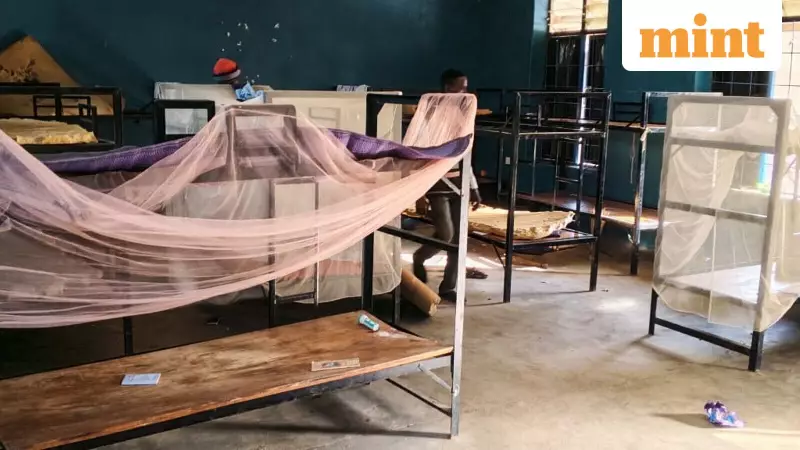
Mass Abduction at Nigerian Boarding School
In a devastating security breach, armed attackers stormed a Catholic boarding school in Nigeria's western region on Friday, seizing more than 200 schoolchildren in one of the largest abductions to hit the country. The Christian Association of Nigeria confirmed that gunmen targeted St. Mary's School located in the Agwara local government's Papiri community, marking the latest in a series of kidnappings plaguing Africa's most populous nation.
Attack Details and Immediate Aftermath
The assault occurred during the early hours of Friday morning at St. Mary's School, a Catholic institution that serves as both a secondary school and primary education facility. According to Daniel Atori, spokesperson for the Niger state chapter of CAN, the attackers abducted 215 pupils and students along with 12 teachers during the raid.
"I just got back to the village tonight after I visited the school where I also met with parents," Atori stated, quoting the Most Rev. Bulus Dauwa, the CAN chairman in Niger. The association emphasized they are working diligently "to ensure our children's safe return."
Satellite imagery reveals the school compound contains over 50 classroom and dormitory buildings and is situated near a major road connecting Yelwa and Mokwa towns. The Niger State Police Command confirmed immediate deployment of military and security forces to the area following the incident.
Community Trauma and Government Response
The attack has left families in anguish as they await news about their children. Dauda Chekula, 62, revealed that four of his grandchildren aged between 7 and 10 were among those taken. "We don't know what is happening now, because we have not heard anything since this morning," Chekula expressed desperately.
Disturbingly, the Niger state government disclosed that the abduction occurred despite prior intelligence warnings about heightened security threats. In an official statement, authorities criticized the school administration for reopening "without notifying or seeking clearance from the State Government, thereby exposing pupils and the staff to avoidable risk."
Umar Yunus, a Papiri resident, confirmed there were only local security arrangements with no official police or government forces protecting the school during the attack. The Catholic Diocese of Kontagora reported that a security staffer was "badly shot" during the assault.
Broader Security Crisis and National Impact
This mass kidnapping represents the latest in a disturbing pattern of school attacks across Nigeria. Just days earlier, gunmen abducted 25 schoolgirls from a high school in neighboring Kebbi state, approximately 170 kilometers from Papiri. In a separate incident in Kwara state, which borders Niger state, attackers targeted a church, killing two people and kidnapping 38 worshippers.
The escalating violence prompted Nigerian President Bola Tinubu to cancel his trip to the Group of 20 summit in South Africa. Vice President Kashim Shettima, who will represent Nigeria instead, vowed during a visit to Kebbi state that "We will use every instrument of the state to bring these girls home and to ensure that the perpetrators of this wickedness face the full weight of justice."
In response to the security crisis, authorities have ordered the immediate closure of 47 federal unity colleges located predominantly in conflict-affected northern states. These elite government schools typically draw attendance from across Nigeria.
Historical Context and Ongoing Challenges
Abductions have become increasingly common in Nigeria's security landscape since the infamous 2014 Chibok schoolgirls incident where Boko Haram extremists seized 276 students. Analysts note that at least 1,500 students have been abducted in the region over the past decade.
While no group has claimed responsibility for the recent attacks in Niger and Kebbi states, security experts and local residents attribute the violence to armed gangs often comprising former herders who have taken up weapons against farming communities amid resource conflicts.
The situation highlights deeper systemic issues, including failure to prosecute known attackers and corruption that limits weapons supplies to security forces while maintaining steady arms flow to criminal gangs.
Personal Stories and Public Outcry
Eze Gloria Chidinma, a 27-year-old Lagos-based influencer known as "Riaz Kitchen," shared that her sister managed to escape during the attack by jumping a fence. Tragically, this isn't the first time her family has experienced Nigeria's kidnapping epidemic.
"My mother and my older brother were kidnapped last year. We called security, we called the police, and they just said there is nothing they can do," Chidinma revealed, noting her family had to pay "a huge amount of money" for their release.
She directed a poignant message to authorities: "Think about the people. Your job is to protect lives and properties. People's lives should matter to you."
Yohanna Buru, a pastor and head of the Peace Revival And Reconciliation Foundation, echoed these concerns, calling for enhanced security around schools in crisis-affected areas. "If the government was doing enough, then rampant kidnappings all over the country would not have happened," Buru stated. "It's as if they don't care about the future of our children."





